Francesca Costanzo
Distributed Intelligent Sensing and Communications for 6G: Architecture and Use Cases
Apr 17, 2025



Abstract:The Distributed Intelligent Sensing and Communication (DISAC) framework redefines Integrated Sensing and Communication (ISAC) for 6G by leveraging distributed architectures to enhance scalability, adaptability, and resource efficiency. This paper presents key architectural enablers, including advanced data representation, seamless target handover, support for heterogeneous devices, and semantic integration. Two use cases illustrate the transformative potential of DISAC: smart factory shop floors and Vulnerable Road User (VRU) protection at smart intersections. These scenarios demonstrate significant improvements in precision, safety, and operational efficiency compared to traditional ISAC systems. The preliminary DISAC architecture incorporates intelligent data processing, distributed coordination, and emerging technologies such as Reconfigurable Intelligent Surfaces (RIS) to meet 6G's stringent requirements. By addressing critical challenges in sensing accuracy, latency, and real-time decision-making, DISAC positions itself as a cornerstone for next-generation wireless networks, advancing innovation in dynamic and complex environments.
Distributed Intelligent Integrated Sensing and Communications: The 6G-DISAC Approach
Feb 28, 2024Abstract:This paper introduces the concept of Distributed Intelligent integrated Sensing and Communications (DISAC), which expands the capabilities of Integrated Sensing and Communications (ISAC) towards distributed architectures. Additionally, the DISAC framework integrates novel waveform design with new semantic and goal-oriented communication paradigms, enabling ISAC technologies to transition from traditional data fusion to the semantic composition of diverse sensed and shared information. This progress facilitates large-scale, energy-efficient support for high-precision spatial-temporal processing, optimizing ISAC resource utilization, and enabling effective multi-modal sensing performance. Addressing key challenges such as efficient data management and connect-compute resource utilization, 6G- DISAC stands to revolutionize applications in diverse sectors including transportation, healthcare, and industrial automation. Our study encapsulates the project vision, methodologies, and potential impact, marking a significant stride towards a more connected and intelligent world.
Goal-Oriented and Semantic Communication in 6G AI-Native Networks: The 6G-GOALS Approach
Feb 12, 2024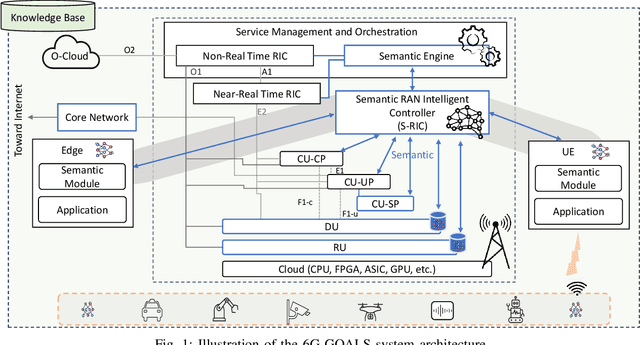

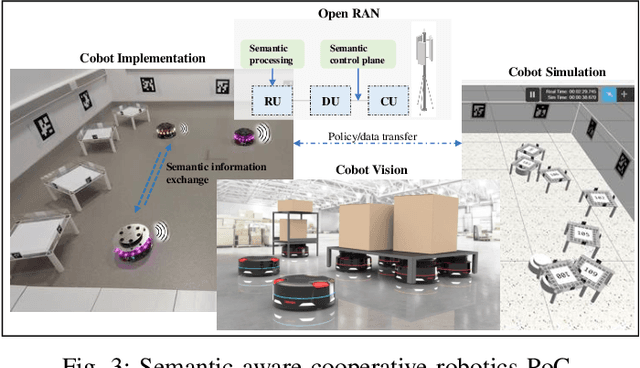
Abstract:Recent advances in AI technologies have notably expanded device intelligence, fostering federation and cooperation among distributed AI agents. These advancements impose new requirements on future 6G mobile network architectures. To meet these demands, it is essential to transcend classical boundaries and integrate communication, computation, control, and intelligence. This paper presents the 6G-GOALS approach to goal-oriented and semantic communications for AI-Native 6G Networks. The proposed approach incorporates semantic, pragmatic, and goal-oriented communication into AI-native technologies, aiming to facilitate information exchange between intelligent agents in a more relevant, effective, and timely manner, thereby optimizing bandwidth, latency, energy, and electromagnetic field (EMF) radiation. The focus is on distilling data to its most relevant form and terse representation, aligning with the source's intent or the destination's objectives and context, or serving a specific goal. 6G-GOALS builds on three fundamental pillars: i) AI-enhanced semantic data representation, sensing, compression, and communication, ii) foundational AI reasoning and causal semantic data representation, contextual relevance, and value for goal-oriented effectiveness, and iii) sustainability enabled by more efficient wireless services. Finally, we illustrate two proof-of-concepts implementing semantic, goal-oriented, and pragmatic communication principles in near-future use cases. Our study covers the project's vision, methodologies, and potential impact.
Control Aspects for Using RIS in Latency-Constrained Mobile Edge Computing
Dec 19, 2023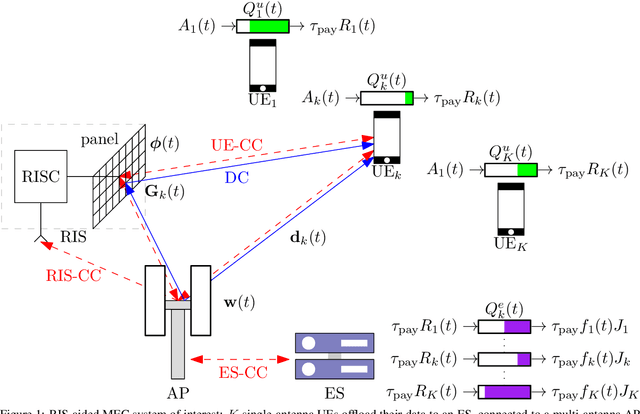
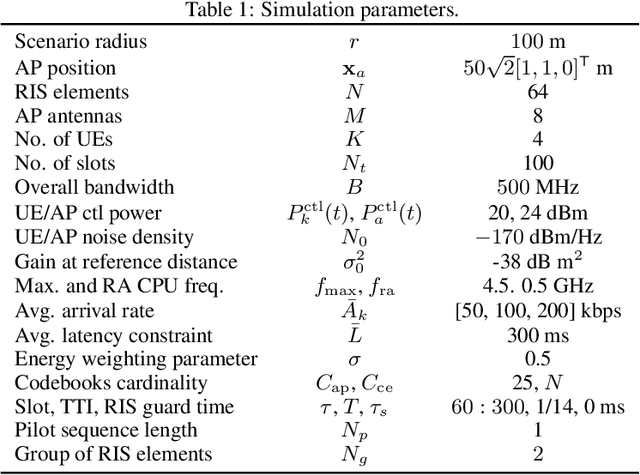
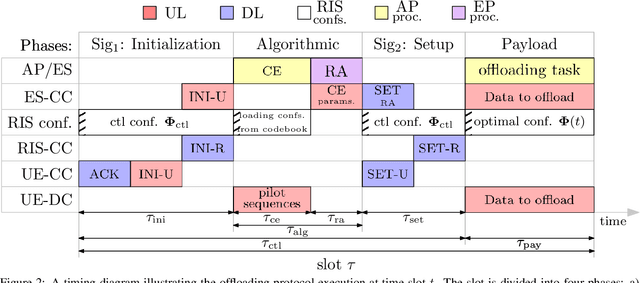
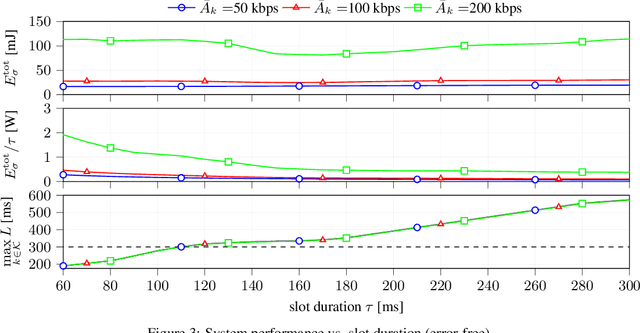
Abstract:This paper investigates the role and the impact of control operations for dynamic mobile edge computing (MEC) empowered by Reconfigurable Intelligent Surfaces (RISs), in which multiple devices offload their computation tasks to an access point (AP) equipped with an edge server (ES), with the help of the RIS. While usually ignored, the control aspects related to channel estimation (CE), resource allocation (RA), and control signaling play a fundamental role in the user-perceived delay and energy consumption. In general, the higher the resources involved in the control operations, the higher their reliability; however, this introduces an overhead, which reduces the number of resources available for computation offloading, possibly increasing the overall latency experienced. Conversely, a lower control overhead translates to more resources available for computation offloading but impacts the CE accuracy and RA flexibility. This paper establishes a basic framework for integrating the impact of control operations in the performance evaluation of the RIS-aided MEC paradigm, clarifying their trade-offs through theoretical analysis and numerical simulations.
Power Minimizing MEC Offloading with QoS Constraints over RIS-Empowered Communications
Dec 15, 2023Abstract:This work lies at the intersection of two cutting edge technologies envisioned to proliferate in future 6G wireless systems: Multi-access Edge Computing (MEC) and Reconfigurable Intelligent Surfaces (RISs). While the former will bring a powerful information technology environment at the wireless edge, the latter will enhance communication performance, thanks to the possibility of adapting wireless propagation as per end users' convenience, according to specific service requirements. We propose a joint optimization of radio, computing, and wireless environment reconfiguration through an RIS, with the goal of enabling low power computation offloading services with reliability guarantees. Going beyond previous works on this topic, multi-carrier frequency selective RIS elements' responses and wireless channels are considered. This opens new challenges in RIS optimization, accounting for frequency dependent RIS response profiles, which strongly affect RIS-aided wireless links and, as a consequence, MEC service performance. We formulate an optimization problem accounting for short and long-term constraints involving device transmit power allocation across multiple subcarriers and local computing resources, as well as RIS reconfiguration parameters according to a recently developed Lorentzian model. Besides a theoretical optimization framework, numerical results show the effectiveness of the proposed method in enabling low power reliable computation offloading over RIS-aided frequency selective channels.
 Add to Chrome
Add to Chrome Add to Firefox
Add to Firefox Add to Edge
Add to Edge